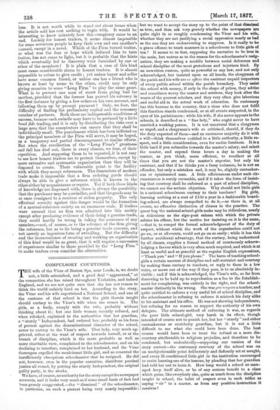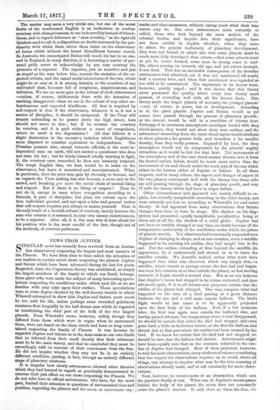COMPULSORY COURTESIES.
THE wife of the Vicar of Boston Spa, near Leeds, is, we doubt not, a little astonished, and a good deal "aggravated," at the commotion she has raised throughout Yorkshire, and indeed England, and we are not quite sure that she has not reason to think the world unfairly hard on her. According to the story, the Vicar and his wife superintend a National School, and one of the customs of that school is that the girls therein taught should curtsey to the Vicar's wife when she comes in. The girls, as a body, comply with the rule, probably without thinking about it ; but one little woman recently refused, and when rebuked, explained to the authorities that her guardian, a " sturdy " Independent, had ordered her, probably as his form of protest against the denominational character of the school, never to curtsey to the Vicar's wife. That lady, very much ag- grieved, either at the want of respect towards herself, or at the breach of discipline, which is the more probable as well as more charitable view, complained to the schoolmaster, and on his declining to interfere, complained to her husband, and the Vicar thereupon expelled the recalcitrant little girl, and so censured the insufficiently obsequious schoolmaster that he resigned. He did not, however, even in the popular narrative, distribute poetical justice all round, by putting the sturdy Independent, the original guilty party, in the stocks.
We have, of course, no authority for the story except the newspaper accounts, and it looks very much as if some small basis of fact had been grossly exaggerated,—the " dismissal " of the schoolmaster, in particular, on such a pretext being very nearly impossible ; but we want to accept the story up to the point of that dismissal as true, and then ask very gravely whether the newspapers are quite right in so roughly condemning the Vicar and his wife, whether they are not justifying a social oppression nearly as bad as the one they are endeavouring to suppress. Is it really to be a grave offence to teach manners in a schoolroom to little girls of ten ? It seems to us that, supposing the narrative to be true in the main, but untrue as to the reason for the schoolmaster's resig-
nation, they are making a muddle between social deference and school discipline of the most gratuitous and injurious kind. By
an unwritten custom, quite as powerful as any law, and not only acknowledged, but insisted upon on all hands, the clergyman of the parish and his wife are ex officio the assistant unpaid inspectors of every public school within the parish boundary. They assist the school with money, if only in the shape of prizes, they advise and sometimes worry the muter and mistress, they look after the wants of the poorest scholars, and they very often give laborious and useful aid in the actual work of education. So customary
has this become in the country, that a vicar who does not fulfil this function stands condemned, or at all events suspected, in the
eyes of his parishioners ; while his wife, if she never appears lathe schools, is described as a "fine lady," who ought never to have married a working parson. it is not unnatural that a clergyman so urged, and a clergyman's wife so criticised, should, if they do
the duty expected of them—and an enormous majority do it with a will—think themselves entitled to a little authority, a little re- spect, and a little consideration, even for undue fussiness. It is a
little hard if you subscribe towards the master's salary, and select the master, and expend three hours a day in making the master, as you think, more efficient, to recollect at all
times that you are not the master's superior, but only his assistant, and that if he thinks you a fussy nuisance, he is not an
offender, but only a mistaken and, it may be, slightly cantanker- ous or opinionated man. A little officiousness under such cir- cumstances is surely excusable, and if it takes the form of insist- ing that courtesy shall be enforced as a part of school discipline,
we cannot see the serious objection. Why should not little girls in a national schoolroom curtsey to their teachers? Big girls,
learning nothing at a cost of /150 a year in a fashionable board- ing-school, are always compelled to do it,—so there is, at all events, no offensive distinction of classes in the practice. The queer bop the national school-girls make may be ridiculous, nearly as ridiculous as the sign-post salaam with which the private salutes his officer, but the motive for insisting on it is the same, —that is, to compel the formal acknowledgment of the duty of respect, without which the work of the organisation could not go on, or at all events, could not go on so easily ; while it has this further accidental advantage, that the curtsey, being understood
by all classes, supplies a formal method of courteously acknow- ledging a favour which is very often much required, and which is at
least as useful and as graceful as the regular English expressions, "Thank you" and "If you please." The harm of teaching school- girls a certain amount of discipline and self-restraint and courtesy by making them curtsey to teachers, or reply to them in a low voice, or move out of the way if they pass, is to us absolutely in- visible ; and if this is acknowledged, the Vicar's wife, so far from deserving to be held up to reprobation as a foe to the Establish- ment for complaining, was entirely in the right, and the school- master distinctly in the wrong. She was pro tempore a teacher, and quite entitled to enforce a very useful bit of school discipline, and the schoolmaster in refusing to enforce it mistook his duty alike to his assistant and his office. He was not showing independence, but refusing for no reason to support the authority of his own delegate. The ultimate method of enforcing it was, as regards the poor little school-girl, very harsh in its effect, though intended of couree not to punish her, but her " sturdy " and either cantankerous or crotchetty guardian, but it is not a little difficult to see what else could have been done. The beat course would have been to treat the refusal as a mere dis- courtesy attributable to religious prejudice, and therefore to be condoned, but undoubtedly—supposing our version of the story correct—the customarry courtesy of the school was on an unobjectionable point deliberately and defiantly set at naught, and every ill-conditioned little girl in the institution encouraged to resist learning one of the lessons, by pleading that her guardian had told her not to learn it. How long would a school so man- aged keep itself alive, or be of any serious benefit to a class which gains, like everybody else, quite as much from the discipline taught in school, the habit of respect even in such trifles as saying " sir " to a master, as from any positive instruction it receives?
The matter may seem a very trivial one, but one of the worst Alas of the uneducated English is an inclination to confuse courtesy with obsequiousness, to see in it servility instead of friend- liness, and to regard deference as "man-worship," as the rigid old Quakers used to call it, a disposition no doubt increased by the per- tinacity with which those above them insist on the observance of forms which without the latent friendliness become unreal. In Australia the emancipated Briton will touch his hat to no one, and in England, in many districts, it is becoming a matter of per- sonal pride never to acknowledge by any easy courtesy the presence of a superior. The superior, just as sensitive and just as stupid as the man below him, resents the omission of the ex- pected tribute, and the casual social intercourse of the two, which might be as easy as it is among Asiatics, or the members of any cultivated class, becomes full of roughness, suspiciousness, and irritation. We see no more gain in the refusal of such observances —unless, of course, deliberately done with the intention of marking disapproval—than we see in the refusal of any other un- burdensome and expected kindliness. All that is required by self-respect is that if the observance, whatever it is, is not a matter of discipline, it should be reciprocal. If the Vicar will remain unbending as he passes down the high street, hats should not move to him ; but if he returns the courtesy he receives, and it is paid without a sense of compulsion, where on earth is the degradation ? All that follows is a slight diminution in the excessive isolation which Englishmen seem disposed to consider equivalent to independence. The Prussian peasant who, except towards officials, is the most in- dependent man on earth, will not answer a questioner who does not raise his hat ; but he thinks himself wholly wanting in light, if, the courtesy once conceded, he does not instantly respond. The rough English idea, we fear, would be to insist on the observance, but leave it unnoticed and unreciproc,ated. What, in particular, does the poor man gain by choosing to become, and as regards the Vicar making him also become, a mere unit in the crowd, and breaking pro tanto the social chain of mutual liking and respect. But if there is no liking or respect? Then do not do it, except in cases where recognition according to a formula, is part of discipline, but place the refusal upon the true individual ground, and not upon a false and general notion that self-respect requires you always to isolate yourself. That is the only result of a boorish refusal of courtesy, merely because the man who returns it is assumed, in your own uneasy consciousness, to be a superior. After all, it is the man who is least afraid for his position who is the most careful of the fact, though not of the method; of external politeness.



































 Previous page
Previous page